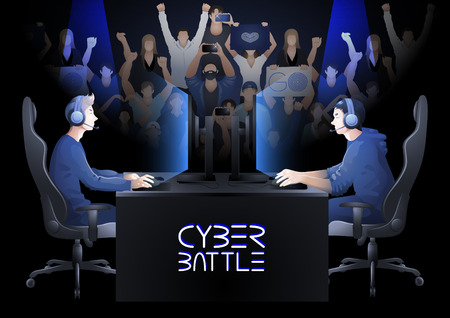 No longer are video games exclusively associated with “lonely and isolated ‘couch potatoes’ . . . [that] are far from aspirational figures.” The rise of eSports over the years shows video games have become both mainstream and even an art form.
No longer are video games exclusively associated with “lonely and isolated ‘couch potatoes’ . . . [that] are far from aspirational figures.” The rise of eSports over the years shows video games have become both mainstream and even an art form.
Recently, eSports have exploded in popularity to the point that college conferences, such as the Big 10, are now fielding eSports teams. Patented technologies and partnerships in the eSports field have been developed to take advantage of this boom as well. However, there are problems with enforcing IP rights, both because the patents could be potentially held as ineligible subject matter and the ownership rights for the IP are difficult to determine.
What are eSports?
First played at Stanford University on October 19, 1972, eSports are competitions involving electronic systems, such as videogames, that are broadcast online. While any multiplayer videogame is eligible for eSports competitions, the most commonly played genres include Multiplayer Online Battle Arena (MOBA), Real-Time Strategy (RTS) First Person Shooters (FPS), Fighting and Sports. Within these genres, the games League of Legends, StarCraft II, Counter-Strike: Global Offensive, Super Smash Brothers and FIFA are among the most frequently played videogames at eSports competitions.
The eSports market is also enormous, and is projected to have a marketplace value of over $1 billion in 2019. Additionally, tournaments will frequently sell out large arenas such as Madison Square Garden. Global football clubs have even signed gamers to be brand ambassadors for the clubs and represent them in FIFA competitions.
Several universities have also involved themselves with eSports. For example, Robert Morris University in Chicago started giving students scholarships for eSports in 2014. These scholarships totaled up to $19,000 in room and board, similar to NCAA athletes in other college sports. Also, as of January 2017, most of the universities in the Big 10 Conference are fielding eSports teams for videogames such as League of Legends. The games will not only be streamed online but also on the Big 10 Network, which will broadcast the championship in March. In fact, on January 30th, Rutgers University and the University of Maryland faced each other in the first eSports broadcast in the Big 10 conference. The Pacific-12 conference has even expressed an interest in developing eSports programs.
Intellectual Property and eSports
Due to eSports’ popularity, there have been several efforts to obtain IP protection for the competition. For example, several patents have been obtained. First, U.S. Patent No. 8,882,576, called Determining Game Skill Factor (“’576 patent”), discloses an algorithm evaluating how much of the outcome of a given game depends on skill vs. chance. Second, U.S. Patent No. 9,349,246 discloses an integration portal (“’246 patent”), which allows game developers to implement a tournament management platform through self-service. The integration portal also allows a peer-to-peer wagering platform.
Potential IP Challenges for eSports
However, there are several potential challenges to the IP rights obtained for eSports. Enforcement of the patents described above could be thwarted by a subject matter eligibility challenge at district court, and the court could find that the patent claims are ineligible subject matter. The patent owner would have to convince the court that its claims are directed to a specific computer tied to the algorithm and integration portal, as the Supreme Court described in Alice v. CLS Bank. That case established a now-famous test: 1) whether the claims in these patents are directed to a patent-ineligible concept and 2) whether the claim’s elements, considered individually and as an ordered combination, transform the nature of the claims into a patent-eligible application.
Most likely, the patented technologies would be challenged as abstract ideas not tied to a specific computer, and having no claim elements that transform the nature of the claims into a patent-eligible application. It is uncertain whether the claims could survive a challenge under a subject matter eligibility challenge during district court litigation, because the success of the subject matter eligibility challenge is highly dependent on the type of patented technology being challenged.
A petitioner may also try to attack these patents by filing an inter partes review (IPR) petition at the Patent Trial and Appeal Board (PTAB). While IPRs may only be instituted under grounds of obviousness or anticipation, any currently valid patent is eligible for an IPR challenge. IPR petitions are also routinely filed, since the petitioner only needs to show that a patent is invalid by a preponderance of the evidence, as opposed to the clear and convincing evidence standard in district court litigation. Further, in an IPR, the chances of a claim surviving are only a little more than a coin flip (51%) both before the IPR institution decision and the final written decision. Given the fact that electrical and computer patents are not only more targeted than all other types of technologies combined for IPRs, and the fact that over 80% of IPR filings occur during a co-pending federal district court litigation, the owners of the ‘576 and ‘246 patents will have to be cautious when enforcing them. Even if someone infringes their patents, the tables could be turned against the owners with an IPR petition or subject matter eligibility challenge during district court litigation.
There have also been issues in copyright law surrounding eSports and video games. Under the US Copyright Act, videogames are considered audiovisual works. One of the rights associated with copyright owners is the exclusive right to publicly perform the work and reproduce copies. In 2015, a Twitch stream, named SpectateFaker, aired an eSports player’s gaming streams through the Twitch platform. Azubu, the platform that had the exclusive streaming rights for the player, filed a complaint against Twitch under the Digital Millennium Copyright Act, and alleged copyright infringement. The lawsuit did not involve Riot, the company that owned the copyright for the contents of the game Faker was streaming.
Further, even though universities and teams are starting to develop independent eSports teams, the game publishers own the intellectual property for their videogames. As a result, these publishers, which include Riot Games, Valve and Blizzard, have control over the eSports teams, leagues, players and broadcasting deals. This is a major contrast to traditional sports leagues such as the NBA or MLB, because those organizations do not own the IP rights to football and baseball.
Because the publishing companies have such a large degree of control over their teams and revenue, players usually make their income through sponsorships, endorsements and deals to stream their games online, and not by playing the videogames, in contrast to professional athletes in other sports.
Therefore, eSports and IP have a complicated relationship. As seen with the lawsuit Azubu filed, multiple companies can have different rights under the copyright laws. The publishing companies also own the IP for the videogames, and players currently have limited earning rights with the existing IP. Thus, further complex litigation involving the performance, reproduction and ownership of IP is expected in the eSports industry.

![[IPWatchdog Logo]](https://ipwatchdog.com/wp-content/themes/IPWatchdog%20-%202023/assets/images/temp/logo-small@2x.png)


![[Advertisement]](https://ipwatchdog.com/wp-content/uploads/2024/04/Patent-Litigation-Masters-2024-sidebar-700x500-1.jpg)

![[Advertisement]](https://ipwatchdog.com/wp-content/uploads/2021/12/WEBINAR-336-x-280-px.png)
![[Advertisement]](https://ipwatchdog.com/wp-content/uploads/2021/12/2021-Patent-Practice-on-Demand-recorded-Feb-2021-336-x-280.jpg)
![[Advertisement]](https://ipwatchdog.com/wp-content/uploads/2021/12/Ad-4-The-Invent-Patent-System™.png)






Join the Discussion
One comment so far.
Caesar Salazar
March 26, 2017 04:52 pmVideo games are a whole different ballgame. Sure there is copyright for the games themselves, but millions of people livestream their games everyday on the internet. If that was somehow regulated, there would be a huge backlash from the younger generation, i.e. the ones buying/streaming/watching video games.
As for the patents on algorithms to do stuff, they seem like a stretch at best.
Patent owners should stick to pharmaceuticals, as they present the strongest case for patent protection. Software, and especially video games, seem like a dead end.